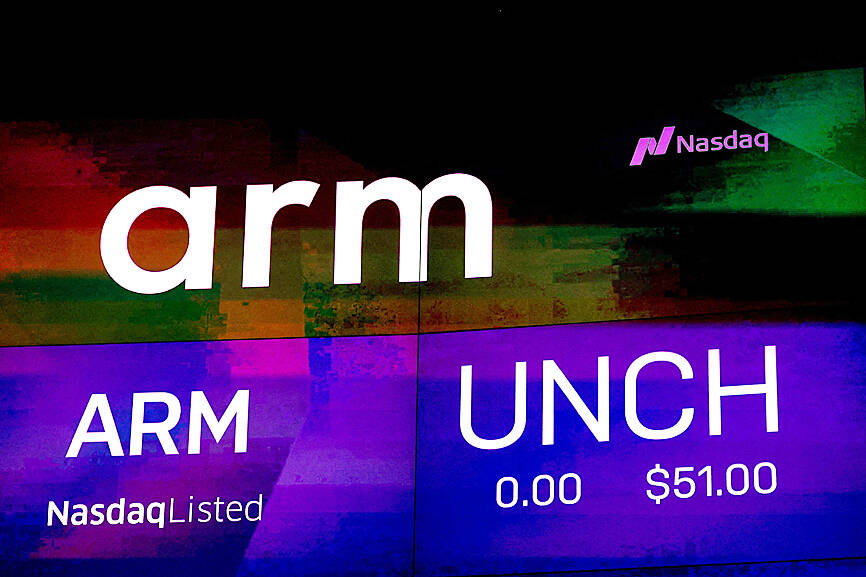Arm Holdings PLC on Wednesday forecast fiscal fourth-quarter sales and adjusted profit above Wall Street expectations as customers aim to design new chips for artificial intelligence (AI) work, generating higher royalties for the British technology firm.
Arm’s forecast ranges for its fourth quarter had midpoints of US$875 million for sales and US$0.30 per share for adjusted earnings, above estimates of US$780.3 million and U$$0.21 per share, LSEG data showed.
For the full fiscal year, Arm expects US$3.18 billion in revenue and adjusted earnings of US$1.22 per share, both above analysts’ estimates of US$3.05 billion and US$1.07 per share.

Photo: REUTERS
“We’re seeing more interest in newer designs and newer technologies by customers” due to interest in AI, Arm chief financial officer Jason Child said. “It’s real. Folks are actually buying and licensing that technology.”
For the fiscal third quarter, Arm reported sales of US$824 million and adjusted earnings of US$0.29 per share, topping Wall Street estimates of U$$761.6 million and US$0.25 per share.
Arm, which is still majority-owned by Japan’s Softbank Group Corp after a public listing last year, creates intellectual property that underlies most of the world’s smartphone chips.
The company has also expanded into laptops, where customers such as Qualcomm Inc and Nvidia Corp plan to use its technology for forthcoming chips, and data centers, where Microsoft Corp and Amazon.com Inc now offer Arm-based central processors to developers via their cloud computing businesses.
Arm makes money via licensing deals for its intellectual property and a royalty charged for each chip sold that uses its technology. The company’s US$75 billion valuation on just over US$3 billion in expected fiscal 2024 revenue — a multiple higher than any other firm in the chip industry — rests on its stated plan to obtain far higher royalties per chip than it has historically.
After a smartphone slump last year that caused Arm sales to contract, analysts expect Arm revenue to expand this year as consumers look to upgrade smartphones and laptops for new generative AI services such as chatbots.
Many of the chips in those devices will use the ninth generation of Arm’s core chip architecture, for which the company is charging higher royalty rates than previous versions.

When an apartment comes up for rent in Germany’s big cities, hundreds of prospective tenants often queue down the street to view it, but the acute shortage of affordable housing is getting scant attention ahead of today’s snap general election. “Housing is one of the main problems for people, but nobody talks about it, nobody takes it seriously,” said Andreas Ibel, president of Build Europe, an association representing housing developers. Migration and the sluggish economy top the list of voters’ concerns, but analysts say housing policy fails to break through as returns on investment take time to register, making the

NOT TO WORRY: Some people are concerned funds might continue moving out of the country, but the central bank said financial account outflows are not unusual in Taiwan Taiwan’s outbound investments hit a new high last year due to investments made by contract chipmaker Taiwan Semiconductor Manufacturing Co (TSMC, 台積電) and other major manufacturers to boost global expansion, the central bank said on Thursday. The net increase in outbound investments last year reached a record US$21.05 billion, while the net increase in outbound investments by Taiwanese residents reached a record US$31.98 billion, central bank data showed. Chen Fei-wen (陳斐紋), deputy director of the central bank’s Department of Economic Research, said the increase was largely due to TSMC’s efforts to expand production in the US and Japan. Investments by Vanguard International

EARLY TALKS: Measures under consideration include convincing allies to match US curbs, further restricting exports of AI chips or GPUs, and blocking Chinese investments US President Donald Trump’s administration is sketching out tougher versions of US semiconductor curbs and pressuring key allies to escalate their restrictions on China’s chip industry, an early indication the new US president plans to expand efforts that began under former US president Joe Biden to limit Beijing’s technological prowess. Trump officials recently met with their Japanese and Dutch counterparts about restricting Tokyo Electron Ltd and ASML Holding NV engineers from maintaining semiconductor gear in China, people familiar with the matter said. The aim, which was also a priority for Biden, is to see key allies match China curbs the US

STRUGGLING TO SURVIVE: The group is proposing a consortium of investors, with Tesla as the largest backer, and possibly a minority investment by Hon Hai Precision Nissan Motor Co shares jumped after the Financial Times reported that a high-level Japanese group has drawn up plans to seek investment from Elon Musk’s Tesla Inc to aid the struggling automaker. The group believes the electric vehicle (EV) maker is interested in acquiring Nissan’s plants in the US, the newspaper reported, citing people it did not identify. The proposal envisions a consortium of investors, with Tesla as the largest backer, but also includes the possibility of a minority investment by Hon Hai Precision Industry Co (鴻海精密) to prevent a full takeover by the Apple supplier, the report said. The group is